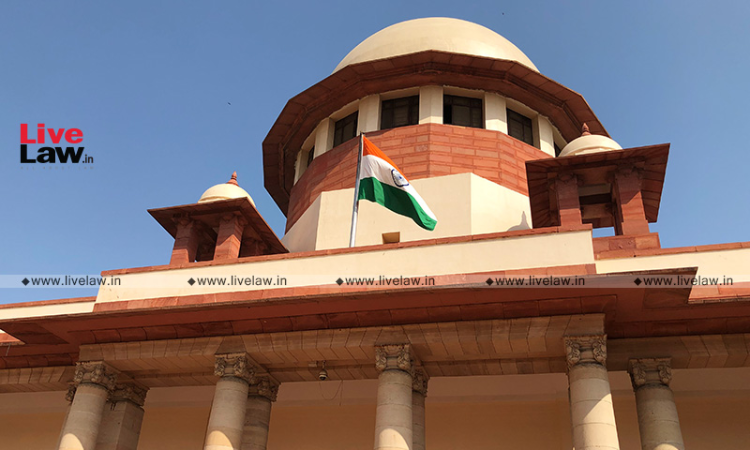Whether An Amendment Application To Include A Relief Which Is Otherwise Time-Barred Can Be Allowed? SC To Consider
LIVELAW NEWS NETWORK
12 April 2022 1:28 PM IST

Whether an amendment application to include a relief which is otherwise time-barred can be allowed? The Supreme Court to consider
The Supreme Court on Friday issued notice in a Petition where the central issue involved was whether a Plaintiff can file an amendment application to include a relief which would otherwise be barred under the Limitation Act 1963. Alternatively, the Petition also raised the issue of whether an amendment application seeking the inclusion of new reliefs, would relate back to the date of filing of the amendment application or the date of institution of the suit.
FACTS:
The dispute revolves around the ownership of a flat where the Petitioners have been residing since 1970. The Respondent claims that they are the actual owners of the said flat, which is contested by the Petitioners. The cause of action in the present suit admittedly arose in 1984.
The Respondents instituted a suit for Declaration of their right and interest in the suit premises before the Cooperative Court, Bombay under the Maharashtra Cooperative Societies Act 1960 in 1995. Thereafter, the Respondents filed an amendment application seeking to include the relief of 'recovery of possession' in 1997, which was allowed by the Cooperative Court, Bombay in 1998. Eventually, the Appellate Authorities under the Maharashtra Cooperative Societies Act 1960 held that the Cooperative Court does not have the jurisdiction to try the Application filed by the Respondents in 2003.
Thus, the suit got instituted before the Hon'ble High Court of Bombay in 2003 and the Respondents sought to take benefit of Section 14, Limitation Act 1963 to exclude the time spent litigating before the Cooperative Courts, Bombay from the prescribed period of limitation. The suit got decreed in the favour of the Respondents in 2015 and the Appeal filed by the Petitioners was dismissed by a Division Bench of the Hon'ble High Court of Bombay 28.02.2022, which was impugned before the Hon'ble Supreme Court by way of a Special Leave Petition. Moreover, at both stages, the Hon'ble High Court of Bombay returned concurrent findings on the issue of Section 14, Limitation Act 1963 and on account of the exclusion of the time-period spent litigating before the Cooperative Court, Bombay, the suit was held to be within limitation. The judgment of the Division Bench of the Hon'ble High Court of Bombay dated 28.02.2022 was impugned before the Hon'ble Supreme Court of India.
SUBMISSIONS:
The issue of the relief sought before the Cooperative Courts, Bombay itself being time barred was raised by the Petitioners before the Hon'ble Supreme Court of India. On behalf of the Petitioners, it was submitted that if an amendment application is allowed, it could only relate back to the date of filing of the amendment application and not the date of filing the suit. The Petitioners relied upon the case of Ashutosh Chaturvedi v. Prano Devi [(2008) 15 SCC 610] wherein it has been held that a relief which is otherwise barred by limitation cannot be sought by way of an amendment application in a civil suit. Further the Petitioners placed reliance upon the case of Vishwambhar v. Laxminarayan [(2001) 6 SCC 163]. Thus, it was submitted that the relief of possession which was sought to be added by way of the amendment application would not be tenable as the amendment was filed beyond the prescribed period of limitation.
On the other hand, the Respondents submitted that the amendment application was allowed and the question of limitation was already decided by the Co-operative Court, which order has also attained finality, having not been challenged by the Petitioners. It was submitted that if the amendment is allowed, it must necessarily relate back to the date of filing of the suit and not the date of filing the amendment application. Thus, the relief of 'possession' sought to be included would not be barred by limitation. Reliance was placed on the judgement of the Supreme Court in the case of Siddalingamma vs. Mamtha Shenoy [(2001) 8 SCC 561], wherein it was held that the Amendment must necessarily relate back to the date of institution of the suit. Moreover, they placed reliance on Section 14, Limitation Act 1963 to state that the civil suit itself was within limitation as the time period spent litigating before the Cooperative Court, Bombay would stand excluded.
RECORD OF PROCEEDING:
While there have been concurrent findings against Petitioners in the Courts below, a bench comprising of Justice S. Abdul Nazeer and Justice Vikram Nath observed that the issue of allowing a time-barred relief to be introduced at a later stage would require consideration because by 1998, not only was a suit for declaration barred by limitation, but a suit for possession would also be unmaintainable. In view thereof, the Hon'ble Court directed the parties to maintain status quo qua the possession of the property.
The Petitioner was represented by Mr. K. V. Vishwanathan and Mr. Siddharth Bhatnagar, Senior Advocate, briefed by Mr. Debmalya Banerjee – Partner, Mr. Rohan Sharma, Mr. Kartik Bhatnagar, Mr. Nicholas Choudhury, Mr. Anmol and Mr. Shreesh Chadha, Advocates from M/s Karanjawala & Co. along with Mr. Malcom Siganporia, Advocate.
Click here to read/ download order


